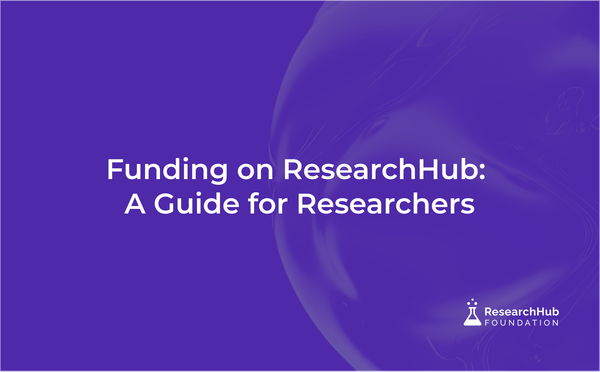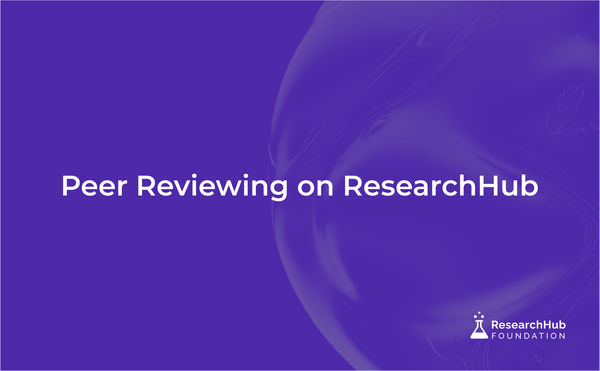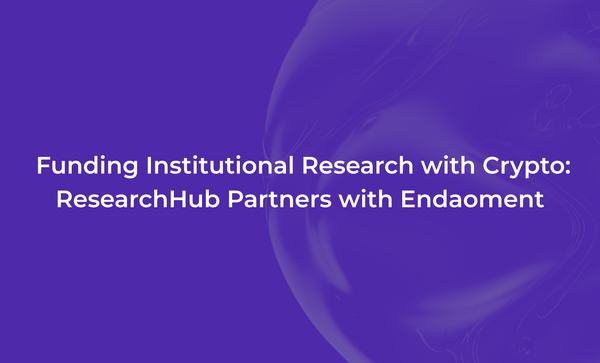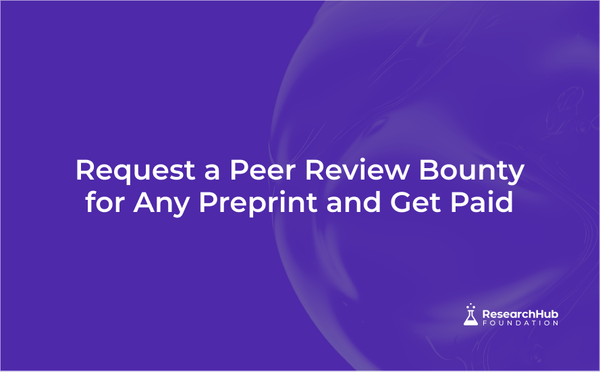Preregistration as a Novel Vehicle for Funding Scientific Research
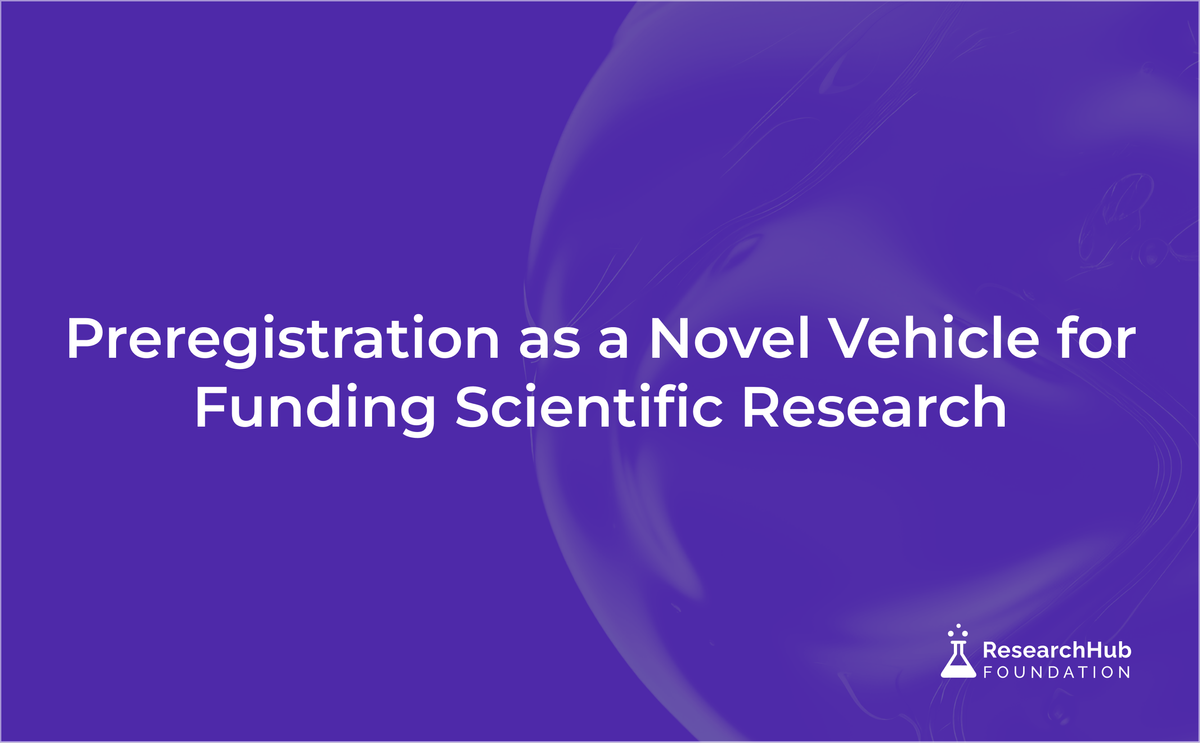
In today's scientific economy, less than half of study outcomes are reported, and less than half of those can be replicated [1, 2]. We're not just facing a reproducibility crisis—we're facing an efficiency catastrophe.
At ResearchHub, we are addressing this problem with a radical idea: funding research before it starts. Beginning today, anyone can crowdfund their latest research project by simply posting a public preregistration to ResearchHub.
Preregistrations offer several advantages over traditional grant applications:
- They are easy to submit.
- They increase the reproducibility of downstream research.
- They reduce publication bias.
We believe that funding research via preregistration will save funders’ resources while increasing the quality and impact of the science they support.
If you are interested in the next generation of scientific funding or want to distribute capital to research areas you're passionate about, please contact: hello@researchhub.com
Background
The traditional grantmaking process—reliant on grant review committees to make funding decisions—creates wasteful financial incentives that yield a poor return on investment for scientific patrons. In 2009, Glasziou et al. estimated that up to 85% of all research funding was wasted, largely due to inefficient behaviors incentivized by how research grants are distributed [3] [4].The core problem is that it is very difficult for research funders to objectively assess the potential of a given scientist or grant application [5]. To address this, the academic community has traditionally relied on publication metrics to provide much needed context on a scientist’s career achievements. In theory, this makes a lot of sense. If a scientist publishes numerous papers and those papers are often cited by other scientists in their field—they are probably pretty talented and worthy of receiving funding.
Unfortunately, grant review committees have become overreliant on citation-based metrics like impact factor and h-index to inform their funding decisions. According to Goodhart's Law:
"When a measure becomes a target, it ceases to be a good measure."
Modern scientists understand that they need to prioritize personal publication metrics in order to have a successful career. Unfortunately, when scientists optimize for these metrics it manifests as wasteful behaviors that drag down the efficiency of research funding as a whole. Examples include:
- Publication bias against negative results: Approximately 50% of studies are never fully reported [1]. Negative results tend to be more boring than statistically significant ones and often go uncited. Sadly, publishing negative results can actually make scientists less likely to receive grant funding in the future [6]. Because of this, a publication bias exists where most negative results are never shared publicly.
- Closed research silos: Two world experts studying the same topic will currently compete instead of sharing resources and collaborating–all due to fear of being "scooped" [7]. If a competitor steals your ideas and publishes them before you can, it can hurt your career and eligibility for future grant funding.
- P-hacking: P-hacking is the practice of manipulating statistical analysis until statistically significant results emerge, even when no true effect exists. Scientists are often tempted to tweak their statistics because results with a p-value of <.05 are more likely to be accepted by prestigious journals [8].
- Scientific misconduct: In extreme scenarios, these incentives can encourage desperate scientists to engage in fraudulent behaviors [9, 10, 11]. Sadly, high-profile research fraud cases have emerged recently—most notably involving the amyloid-beta hypothesis for Alzheimer's Disease [12].
The collective impact of these wasteful behaviors, which have flourished under traditional grantmaking infrastructure, can be seen in what is commonly known as the "replication crisis". Experts believe that less than 50% of biomedical literature can be independently replicated [2].
Across the globe, research funders are collectively wasting hundreds of billions of dollars annually due to their dependence on a traditional grantmaking infrastructure that promotes inefficient behaviors.
What are Preregistrations?
A preregistration is a scientific document that describes a proposed study's hypothesis, experimental methodology, and plan for statistical analyses. Preregistrations have recently gained popularity as a tool scientists can use to improve the reproducibility and trustworthiness of their research [13].
When scientists preregister a study, they intentionally commit to sharing the results derived from a specific, predetermined experimental design. This accomplishes several important things:
- Prevents p-hacking: When authors outline their plan for statistical analysis beforehand, they can't tweak things at the last minute to make their findings appear more significant.
- Discourages publication bias: Public preregistration hinders one's ability to refrain from publishing negative results. There is reputation damage associated with failing to follow up with experimental data, regardless of whether it is positive or negative [14].
- Enables independent replication: Not only are preregistered results more likely to replicate, they also make permissionless, independent replication easier because the experimental design is shared openly [15].
While preregistrations may seem novel, they have been routinely employed within clinical research for decades. Take registered reports, as an example, are clinical journals where accept/reject decisions are made based on the quality of a proposed preregistration [16]. If accepted at the preregistration stage, the resulting study is guaranteed publication–regardless of whether the results are positive or negative.
Recognizing the utility of preregistration, in 1997 the FDA mandated that all clinical trials must be publicly registered on clinicaltrials.gov before being conducted [17]. Preregistration has proven to be a valuable tool for ensuring the quality and reproducibility of clinical research studies.
Preregistration-Based Funding
Fast Grants was a fascinating experiment in rapid, efficient scientific funding that was born in response to the COVID-19 pandemic. Due to the time pressure of a rapidly spreading virus, Fast Grants formed to award over $50 million to researchers for COVID-19 research projects with funding decisions guaranteed in less than 14 days.
One of the key innovations that enabled Fast Grants to move quickly was their willingness to rethink the value of traditional grant applications. Instead of requiring scientists to submit a 50+ page document that takes months to draft but minutes to reject, Fast Grants asked interested researchers to complete a short Google form that included questions like:
- What is this study's significance?
- What hypothesis are you testing?
- What are your proposed experimental methods?
- How do you plan to analyze the resulting data?
- How much money do you need?
When I first clicked through the questions I was taken aback by the Fast Grants team’s creativity. They added a budget to a preregistration and used it as a vehicle to fund novel research in a drastically accelerated fashion.
Despite their increased speed of decision making this process worked remarkably well—Fast Grants was considered highly successful by traditional measures [18]. It funded numerous high-impact projects including the development of SalivaDirect (Yale's saliva-based COVID test), promising clinical trials for repurposed drugs, research on Long COVID, genetic factors affecting outcomes, and surveillance sequencing of variants of concern, resulting in at least 356 published papers to date.
Over the last year, ResearchHub has also explored the potential of using preregistrations as a vehicle to improve on traditional research grants. In total, we have funded 15 preregistrations with $160,000. Check them out here. Examples of preregistered projects we have supported range from:
- Developing a compound that could one day be used to treat multiple types of skin cancer [19].
- Building tools for sharing standardized magnetic resonance spectroscopy data [20].
- Understanding the similarities between Alzheimer's Disease and Type-II Diabetes [21].
To hear more from the funding recipients themselves, here are some testimonial videos:
It's still early days, but the results so far have been promising. We are excited to double down on our efforts to use preregistrations as a novel tool to fund research projects.
ResearchHub's Funding Feature
The goal of building this feature is to help patrons of science achieve a better return on their philanthropic investments. To achieve this we are building a marketplace for research funding that reduces administrative costs, while increasing research quality.
Reducing Administrative Costs
Recruitment of applicants
When new peer review bounties or funding opportunities are posted to our forum, we automatically notify scientific users from our community who have expertise in the given subject area. Instead of targeting our community with ads, we target them with funding opportunities. This helps funders source qualified applicants without any marketing spend.
Incentivized grant review
Our user base is on pace to surpass 10,000 expert peer reviews of bioRxiv preprints in 2025. Since our peer review community is one of our biggest strengths, we can provide expert reviews of the preregistrations funders are most interested in supporting. As we iterate on this crowdsourced style of review, we believe it will soon surpass the quality and speed of traditional grant review committees, while operating at a fraction of the cost.
Efficient transfer of funds
Once a preregistration's budget has been met, the funds will be transferred to the applicant's institutional bank account within ~2 weeks. Normally, universities collect a ~30% overhead fee on grant funding, but ResearchHub will negotiate a maximum of 10% indirect costs for funded preregistrations. Finally, if the grant applicant is associated with a 501(c)(3) nonprofit, any funding they receive will be tax-deductible.
Increasing Quality
Greater reproducibility
Preregistrations fundamentally increase reproducibility by requiring researchers to explicitly outline their hypotheses, methods, and analysis plans before conducting experiments. Unlike traditional peer review, preregistration facilitates feedback at the beginning of the research process—allowing scientists to refine their methodologies before investing resources into data collection.
Increased transparency & speed
The traditional research lifecycle is notoriously inefficient, with scientists often spending years collecting data, writing manuscripts, and navigating peer review. Funding preregistrations disrupts this outdated model by encouraging real-time data sharing under CC-BY-4.0 licenses, allowing anyone to immediately use and build upon these outputs. This transparency accelerates the pace of discovery and ensures that knowledge doesn't remain locked behind the gates of peer review for years.
Higher resolution accountability
ResearchHub's platform allows funders to monitor the journey of their investments from preregistration to community impact, providing unprecedented visibility into the efficacy of their philanthropic efforts. This will hold researchers accountable—not just for producing publications, but also for conducting their studies as previously described and sharing all results, regardless of outcome.
Potential Drawbacks
While preregistrations excel at supporting confirmatory research where hypotheses and methods are defined in advance, they are less suited for exploratory research that follows an iterative, discovery-driven approach. We recognize this limitation, and are initially focusing on confirmatory studies where preregistration offers the greatest value. As we evolve, we will develop flexible funding mechanisms that preserve the transparency benefits of preregistration, while accommodating the potential serendipity of exploratory research that drives scientific breakthroughs.
Finally, we also understand that many in the scientific community are concerned that sharing preregistrations, or practicing open science more broadly, can be risky to one’s career because it creates an opportunity for rivals to scoop your work. We understand this hesitation and we hope that over time we will be able to tune our financial incentives to help offset this risk.
Future Directions
Our vision for this feature extends beyond just funding preregistrations. We're exploring novel approaches, such as minting NFTs to commemorate patrons' support of breakthrough research, creating prediction markets where scientists can forecast which studies will successfully replicate, and potentially launching a registered report feature in the ResearchHub Journal where publication decisions are determined solely by whether a preregistration receives the required crowdfunding. These innovations aim to help scientific funders reduce waste and accelerate progress toward their overarching goals—whether curing cancer, addressing climate change, or solving other pressing challenges—faster and at a fraction of the traditional cost.
If you are frustrated by the current state of research funding and would like to help build a modern alternative–join us in our mission to accelerate science by:
- Commenting on and donating to the preregistrations currently listed on ResearchHub.
- Joining the ResearchHub Foundation Discord to meet folks who are contributing their time & effort to help build ResearchHub.
- Spread the word about ResearchHub to the science nerds in your life!
Bibliography
- https://pmc.ncbi.nlm.nih.gov/articles/PMC7073270/
- https://elifesciences.org/articles/71601
- https://www.thelancet.com/journals/lancet/article/PIIS0140-6736(09)60329-9/abstract
- https://journals.plos.org/plosmedicine/article?id=10.1371/journal.pmed.0020124&kuid=6129b2e2-a57d-49d7-ab1d-87620d9ab0df&kref=https%3A%2F%2Floganchristopher.com%2Fscience-as-propaganda%2F
- https://www.pnas.org/doi/10.1073/pnas.1714379115
- https://onlinelibrary.wiley.com/doi/full/10.1002/leap.1438
- https://datascience.codata.org/articles/10.5334/dsj-2017-029
- https://pmc.ncbi.nlm.nih.gov/articles/PMC4359000/
- https://www.nytimes.com/2023/07/19/us/stanford-president-resigns-tessier-lavigne.html
- https://retractionwatch.com/the-retraction-watch-leaderboard/
- https://en.wikipedia.org/wiki/List_of_scientific_misconduct_incidents
- https://www.science.org/content/article/potential-fabrication-research-images-threatens-key-theory-alzheimers-disease
- https://pmc.ncbi.nlm.nih.gov/articles/PMC5856500/
- https://www.nature.com/articles/d41586-018-07118-1
- https://www.science.org/content/article/preregistering-transparency-and-large-samples-boost-psychology-studies-replication-rate
- https://www.nature.com/articles/s41562-021-01193-7
- https://www.fda.gov/regulatory-information/selected-amendments-fdc-act/food-and-drug-administration-modernization-act-fdama-1997
- https://future.com/what-we-learned-doing-fast-grants/
- https://www.researchhub.com/post/3790/development-of-hlbt-100-a-highly-potent-flavonoid-as-an-anticancer-agent-against-non-melanoma-and-melanoma-skin-cancers
- https://www.researchhub.com/post/1563/reproducibility-made-easy-a-tool-for-transparent-and-standardized-reporting-of-magnetic-resonance-spectroscopy-methods
- https://www.researchhub.com/post/1941/cross-disease-modeling-approach-to-identify-biological-pathways-shared-between-alzheimers-disease-and-type-2-diabetes


